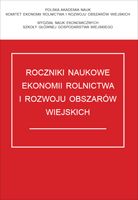Main Article Content
Article Details
Agrarbericht der Bundesregierung Deutschland. 2007:Bonn.
Alvensleben R. 2000: Zur Nachhaltigkeit land- und forstwirtschaftlicher Nutzungssysteme - Anmerkungen aus der Sicht eines Agrarökonomen. Vortrag auf der Tagung der August-Bier-Stiftung und des ZALF am 17.03.2000. Agra-Europe 16/2000 vom 17.4.2000 Sonderbeilage 1-7.
Alvensleben R. 2002: Leitbilder einer zukünftigen Landwirtschaft Anmerkungen aus der Sicht der Umweltökonomie und der Marktforschung, Kiel. Expertenworkshop "Leitbilder einer zukünftigen Landwirtschaft" der Akademie für die Ländlichen Räume Schleswig-Holstein e.V. am 19.3.2002 in Rendsburg.
Foster С, Lampkin N. 2000: Organic and in-conversion land area, holdings, livestock and crop production in Europe [www.organic.aber.ac.uk/library/European_organic_farming.shtml].
Grüner Bericht 2008: Bericht über die Situation der österreichischen Land- und Forstwirtschaft. Bundesministerium für Land- und Forstwirtschaft, Umwelt und Wasserwirtschaft. Wiedeń.
Jackson A., Lampki N. 2005: Organic farm incomes in England and Wales 2003/2004. Institute of Rural Science. Aberystwyth.
Organic Agricultural Land Worldwide 2005-2007. 2007-2009: FiBL, IFOAM, SOEL 2007-2009.
Organic farming in the European Union - Facts and figures. 2005: European Commission. Bruxelles.
Richter T. 2002: Possibilities and barriers for retailing organic products. Research Institute of Organic Agriculture (Switzerland).
Weller R., Jackson A. 2006: Organic dairy farming. Organic Centre Wales (OCW). University of Wales, Institute of Grassland and Environmental Research.
Willer H., Yussefi M. 2001: Organic Agriculture Worldwide - Statistics and Future Prospects. Stiftung Ökologie & Landbau (SOL), Bad Durkheim.
Willer H., Yussefi-Menzlerand M., Sorensen N. 2008: The World of Organic Agriculture - Statistics and Emerging Trends 2008. S International Federation of Organic Agriculture Movements (IFOAM) Bonn, Germany and Research Institute of Organic Agriculture (FiBL), Frick, Switzerland.
Woś A., Zegar J.S. 2002: Rolnictwo społecznie zrównoważone. Instytut Ekonomiki Rolnictwa i Gospodarki Żywnościowej, Warszawa.
Woś. A. 1992: Rolnictwo zrównoważone (Sustainable Agriculture). Zagadnienia Ekonomiki Rolnej, nr 13.
Żakowska-Biemans S., Gutkowska K. 2003: Rynek żywności ekologicznej w Polsce i w krajach Unii Europejskiej. Wyd. SGGW, Warszawa.
Downloads
- Henryk Manteuffel-Szoege, Agnieszka Sobolewska, Life cycle assessment of environmental impact for apple packing boxes , Annals of Agricultural Economics and Rural Development: Vol. 96 No. 4 (2009)
You may also start an advanced similarity search for this article.
- Henryk Runowski, RYSZARD MANTEUFFEL-SZOEGE – A DISTINGUISHED FARM ECONOMIST, THE FOUNDER OF THE SCHOOL OF ECONOMICS AND ORGANIZATION OF FARMS: A MEMOIR ON THE 25TH ANNIVERSARY OF HIS DEATH , Annals of Agricultural Economics and Rural Development: Vol. 103 No. 4 (2016)
- Henryk Runowski, Wojciech Ziętara jako naukowiec, wychowawca i człowiek , Annals of Agricultural Economics and Rural Development: Vol. 97 No. 3 (2010)
- Henryk Runowski, How to use the balance sheet to assess the state of art and the changes of financial and economic situation of breeding companies? , Annals of Agricultural Economics and Rural Development: Vol. 95 No. 2 (2008)
- Henryk Runowski, Theoretical and practical aspects of milk quota trading in agricultural holdings , Annals of Agricultural Economics and Rural Development: Vol. 93 No. 1 (2006)
- Henryk Runowski, Scientific, didactic and organizational activity of Professor Janusz Kosicki - on the occasion of the 90th Anniversary of the Birthday , Annals of Agricultural Economics and Rural Development: Vol. 105 No. 2 (2018)
- Henryk Runowski, Emilia Grzegorzewska, The Prediction Abilities of Polish Discrimination Models in the Analysis of Financial Condition of Agricultural Enterprises , Annals of Agricultural Economics and Rural Development: Vol. 95 No. 3-4 (2008)
- Henryk Runowski, Economic aspects of organic milk production , Annals of Agricultural Economics and Rural Development: Vol. 96 No. 1 (2009)
- Henryk Runowski, Searching for economics-ecological and ethical equilibrium in milk production , Annals of Agricultural Economics and Rural Development: Vol. 93 No. 2 (2007)
- Henryk Runowski, Microeconomic researches in the area of agribusiness in Poland , Annals of Agricultural Economics and Rural Development: Vol. 96 No. 2 (2009)
- Stanisław Stańko, Bogdan Klepacki, Henryk Runowski, 80th Anniversary of prof. dr hab. Zygmunt Wojtaszek , Annals of Agricultural Economics and Rural Development: Vol. 96 No. 4 (2009)




